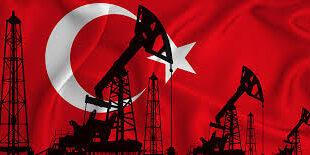President Vladimir Putin has backtracked on an earlier move that banned Russian companies from exporting crude oil in compliance with the G7 price cap of $60 per barrel.
In a decree issued at the end of December, Putin prohibited Russian producers from exporting crude oil and refined products on terms that complied directly or indirectly with the G7 price cap.
On Friday, he amended that decree to allow sales of crude oil to “friendly countries” at any price — regardless of the cap.
Putin and his government use the term “unfriendly countries” to describe nations such as the US, the UK and EU member states that have implemented sanctions against Russia in response to its war in Ukraine.
It applies the term “friendly countries” to nations like China and India that now account for most of Russia’s oil exports, after the loss of its main pre-war market in Europe.
The EU banned most imports of Russian crude oil from Dec. 5 and imports of refined products from Russia from Feb. 5.
The bans were accompanied by G7 price caps that prohibit the use of Western tankers, insurance and financial services for the transport of Russian oil to non-G7 countries, unless it is sold in compliance with the caps.
The cap for crude oil has remained at $60/bbl since its introduction almost five months ago. It is intended to reduce Moscow’s income from oil sales, while allowing Russian oil to keep flowing into the global oil market.
Russian government data indicate that it has been successful in this goal, while a recent statement from the US Treasury Department suggests that Washington and its allies may be stepping up enforcement of the price caps.
Putin’s watering down of his December decree may be intended to shelter “friendly countries” from such enforcement efforts.
Ukraine Seeks Higher Transit Fee
Meanwhile, supplies of Russian crude oil to three small European countries could become more expensive soon, as Ukraine presses for an increase in the pipeline transit fees it earns from those flows.
Russian pipeline operator Transneft said Ukraine wants to raise tariffs for shipping Russian crude through its territory via the Druzhba pipeline, which supplies Hungary, Slovakia and the Czech Republic.
Kyiv wants to raise the transit fee from its current level of €13.60 per ton (about $2.05/bbl) to €17/ton ($2.56/bbl) from Jun. 1 and €21/ton ($3.16) from Aug. 1.
Transneft said its Ukrainian counterpart Ukrtransnafta had informed it about the planned increase, but added that it was not involved in negotiations with the Ukrainian side.
The southern leg of Druzhba shipped about 250,000 barrels per day to Hungary, Slovakia and the Czech Republic via Ukraine in March — with 325,000 b/d scheduled for April-June.
The EU exempted the Druzhba pipeline from its Dec. 5 ban on imports of Russian crude oil in a concession to those three landlocked countries, which are heavily dependent on the pipeline.
Germany and Poland imported even larger volumes of Russian crude via the northern leg of Druzhba in the past, but they voluntarily ended those imports. Both countries can receive seaborne crude cargoes directly.
Ukraine has already increased Druzhba transit fees earlier this year, citing the cost of repairing energy infrastructure damaged by Russian strikes.
Despite the war, Druzhba oil flows have continued without interruption for the most part, although they were briefly paused last year because of problems related to payments.
Up to now, Transneft has paid the transit fees to UkrTransNafta, but sources say that talks are under way for the purchasers of the oil to start making direct payments to UkrTransNafta .
Hungary and Serbia are expected to sign an agreement in June to build a 130 kilometer pipeline connection that would allow non-EU Serbia to be supplied via Druzhba from 2024.
Serbia had previously received seaborne Russian crude via Croatia and an onward pipeline connection, but that route was cut off by EU sanctions against Russia.
Meanwhile, Poland is urging the EU to ban all shipments of Russian crude via Druzhba.
Poland and the small Baltic republics to its East have long pushed the 27-nation EU to adopt even stronger sanctions against Russia, but they have often failed to win the support of other member states.

 Iran Energy News Oil, Gas, Petrochemical and Energy Field Specialized Channel
Iran Energy News Oil, Gas, Petrochemical and Energy Field Specialized Channel



